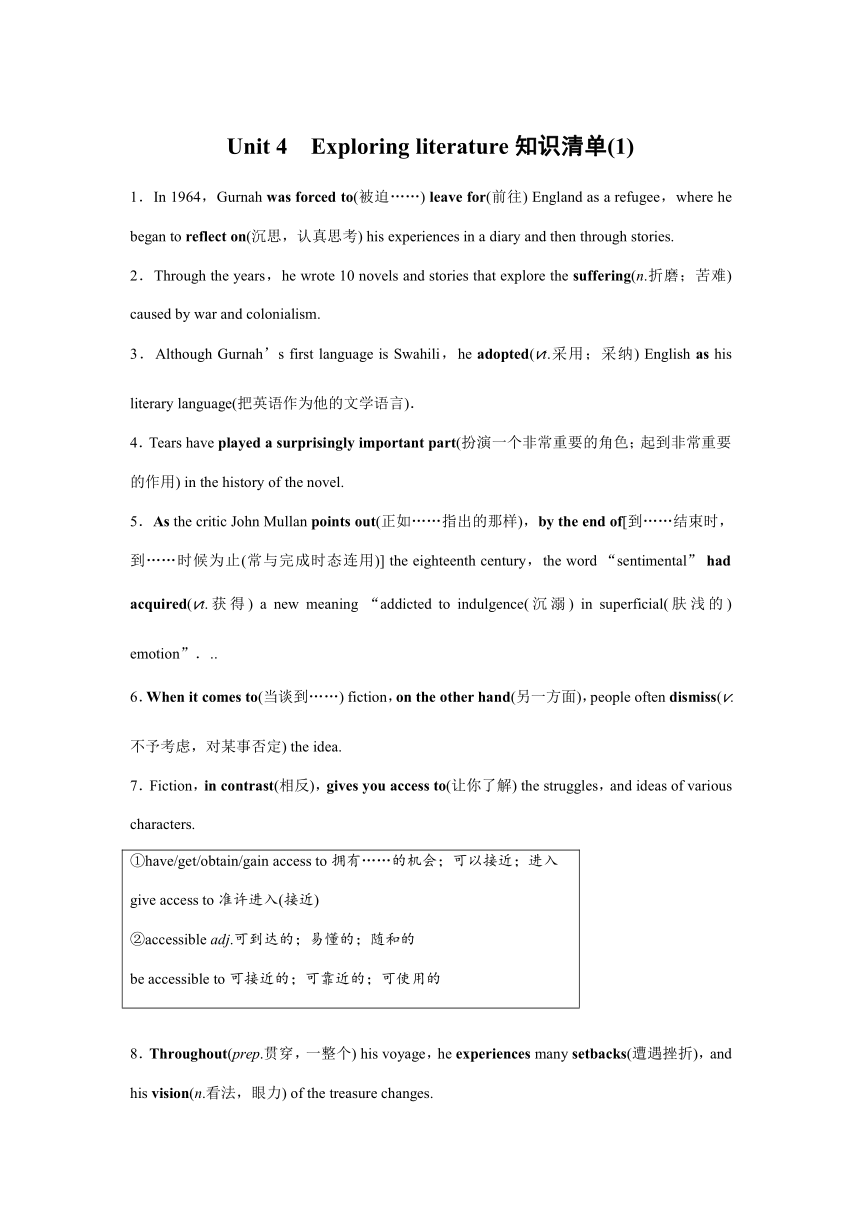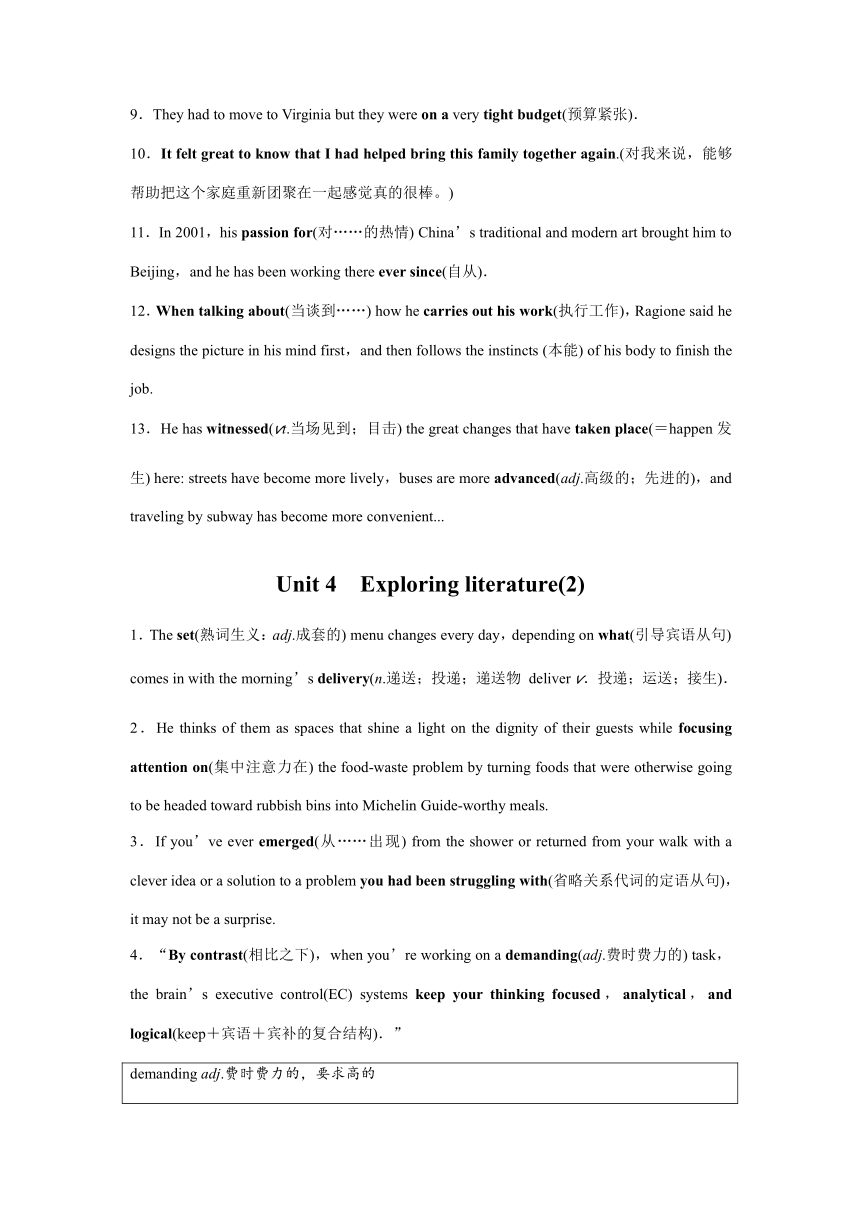Unit 4 Exploring literature 一轮复习 清单(讲义)--2025届高三英语译林版(2020)必修第二册
文档属性
| 名称 | Unit 4 Exploring literature 一轮复习 清单(讲义)--2025届高三英语译林版(2020)必修第二册 |

|
|
| 格式 | docx | ||
| 文件大小 | 24.7KB | ||
| 资源类型 | 教案 | ||
| 版本资源 | 牛津译林版(2019) | ||
| 科目 | 英语 | ||
| 更新时间 | 2025-02-09 22:18:39 | ||
图片预览


文档简介
Unit 4 Exploring literature知识清单(1)
1.In 1964,Gurnah was forced to(被迫……) leave for(前往) England as a refugee,where he began to reflect on(沉思,认真思考) his experiences in a diary and then through stories.
2.Through the years,he wrote 10 novels and stories that explore the suffering(n.折磨;苦难) caused by war and colonialism.
3.Although Gurnah’s first language is Swahili,he adopted(vt.采用;采纳) English as his literary language(把英语作为他的文学语言).
4.Tears have played a surprisingly important part(扮演一个非常重要的角色;起到非常重要的作用) in the history of the novel.
5.As the critic John Mullan points out(正如……指出的那样),by the end of[到……结束时,到……时候为止(常与完成时态连用)] the eighteenth century,the word “sentimental” had acquired(vt.获得) a new meaning “addicted to indulgence(沉溺) in superficial(肤浅的) emotion”...
6.When it comes to(当谈到……) fiction,on the other hand(另一方面),people often dismiss(v.不予考虑,对某事否定) the idea.
7.Fiction,in contrast(相反),gives you access to(让你了解) the struggles,and ideas of various characters.
①have/get/obtain/gain access to拥有……的机会;可以接近;进入 give access to准许进入(接近) ②accessible adj.可到达的;易懂的;随和的 be accessible to可接近的;可靠近的;可使用的
8.Throughout(prep.贯穿,一整个) his voyage,he experiences many setbacks(遭遇挫折),and his vision(n.看法,眼力) of the treasure changes.
9.They had to move to Virginia but they were on a very tight budget(预算紧张).
10.It felt great to know that I had helped bring this family together again.(对我来说,能够帮助把这个家庭重新团聚在一起感觉真的很棒。)
11.In 2001,his passion for(对……的热情) China’s traditional and modern art brought him to Beijing,and he has been working there ever since(自从).
12.When talking about(当谈到……) how he carries out his work(执行工作),Ragione said he designs the picture in his mind first,and then follows the instincts (本能) of his body to finish the job.
13.He has witnessed(vt.当场见到;目击) the great changes that have taken place(=happen发生) here: streets have become more lively,buses are more advanced(adj.高级的;先进的),and traveling by subway has become more convenient...
Unit 4 Exploring literature(2)
1.The set(熟词生义:adj.成套的) menu changes every day,depending on what(引导宾语从句) comes in with the morning’s delivery(n.递送;投递;递送物 deliver v.投递;运送;接生).
2.He thinks of them as spaces that shine a light on the dignity of their guests while focusing attention on(集中注意力在) the food-waste problem by turning foods that were otherwise going to be headed toward rubbish bins into Michelin Guide-worthy meals.
3.If you’ve ever emerged(从……出现) from the shower or returned from your walk with a clever idea or a solution to a problem you had been struggling with(省略关系代词的定语从句),it may not be a surprise.
4.“By contrast(相比之下),when you’re working on a demanding(adj.费时费力的) task,the brain’s executive control(EC) systems keep your thinking focused,analytical,and logical(keep+宾语+宾补的复合结构).”
demanding adj.费时费力的,要求高的 The picking activity is physically demanding,but we all felt excited. demand v.强烈要求;需要,需求 demand to do sth要求做某事;demand+that宾语从句(常用should 表虚拟,should可省略)。 I demanded to see her immediately,but got turned down. Our teacher demanded that all the entries(should) be submitted by Friday. n.要求;需求,需求量 demand and supply需求与供应;be in demand需求大的;on demand 一经要求 meet/satisfy one’s demands满足某人的要求
5.“A cautionary note:While(引导让步状语从句,意为“尽管”) the DM network plays a key role in(在……中起着关键作用) the creative process,it is the EC systems that(强调句:It is+被强调部分+that/who...) help you to evaluate and apply the creative ideas effectively to(将……运用到) your problems in the real world,” Christoff says.
6.Also,the fertilizers and other chemicals that are used to make paper and for tree farming are acid rain contributors,and they also contribute to(导致;有助于) higher rates of waterway eutrophication.
contribute...to...把……捐给……;投稿 make a contribution to为……做贡献
7.A huge amount of(大量) solid waste is from packaging and is often thrown away after a while.
修饰不可数名词表示“大量”的短语:a large amount of/large amounts of a great deal of,a large quantity of/large quantities of
8.While paper cups and dinnerware may seem convenient(adj.方便的 convenience n.方便;便利),they can harm the environment.
It is convenient for sb to do sth.对某人来说做某事是方便的。 at your earliest convenience 尽早;尽快 for convenience 为了方便起见
9.Attached to the photos were several lines(分词置于句首引起的全部倒装) from Preface to Poems Composed at the Orchid Pavilion,an ancient Chinese calligraphy masterpiece by famous Chinese calligrapher Wang Xizhi from the Eastern Jin Dynasty.
1.In 1964,Gurnah was forced to(被迫……) leave for(前往) England as a refugee,where he began to reflect on(沉思,认真思考) his experiences in a diary and then through stories.
2.Through the years,he wrote 10 novels and stories that explore the suffering(n.折磨;苦难) caused by war and colonialism.
3.Although Gurnah’s first language is Swahili,he adopted(vt.采用;采纳) English as his literary language(把英语作为他的文学语言).
4.Tears have played a surprisingly important part(扮演一个非常重要的角色;起到非常重要的作用) in the history of the novel.
5.As the critic John Mullan points out(正如……指出的那样),by the end of[到……结束时,到……时候为止(常与完成时态连用)] the eighteenth century,the word “sentimental” had acquired(vt.获得) a new meaning “addicted to indulgence(沉溺) in superficial(肤浅的) emotion”...
6.When it comes to(当谈到……) fiction,on the other hand(另一方面),people often dismiss(v.不予考虑,对某事否定) the idea.
7.Fiction,in contrast(相反),gives you access to(让你了解) the struggles,and ideas of various characters.
①have/get/obtain/gain access to拥有……的机会;可以接近;进入 give access to准许进入(接近) ②accessible adj.可到达的;易懂的;随和的 be accessible to可接近的;可靠近的;可使用的
8.Throughout(prep.贯穿,一整个) his voyage,he experiences many setbacks(遭遇挫折),and his vision(n.看法,眼力) of the treasure changes.
9.They had to move to Virginia but they were on a very tight budget(预算紧张).
10.It felt great to know that I had helped bring this family together again.(对我来说,能够帮助把这个家庭重新团聚在一起感觉真的很棒。)
11.In 2001,his passion for(对……的热情) China’s traditional and modern art brought him to Beijing,and he has been working there ever since(自从).
12.When talking about(当谈到……) how he carries out his work(执行工作),Ragione said he designs the picture in his mind first,and then follows the instincts (本能) of his body to finish the job.
13.He has witnessed(vt.当场见到;目击) the great changes that have taken place(=happen发生) here: streets have become more lively,buses are more advanced(adj.高级的;先进的),and traveling by subway has become more convenient...
Unit 4 Exploring literature(2)
1.The set(熟词生义:adj.成套的) menu changes every day,depending on what(引导宾语从句) comes in with the morning’s delivery(n.递送;投递;递送物 deliver v.投递;运送;接生).
2.He thinks of them as spaces that shine a light on the dignity of their guests while focusing attention on(集中注意力在) the food-waste problem by turning foods that were otherwise going to be headed toward rubbish bins into Michelin Guide-worthy meals.
3.If you’ve ever emerged(从……出现) from the shower or returned from your walk with a clever idea or a solution to a problem you had been struggling with(省略关系代词的定语从句),it may not be a surprise.
4.“By contrast(相比之下),when you’re working on a demanding(adj.费时费力的) task,the brain’s executive control(EC) systems keep your thinking focused,analytical,and logical(keep+宾语+宾补的复合结构).”
demanding adj.费时费力的,要求高的 The picking activity is physically demanding,but we all felt excited. demand v.强烈要求;需要,需求 demand to do sth要求做某事;demand+that宾语从句(常用should 表虚拟,should可省略)。 I demanded to see her immediately,but got turned down. Our teacher demanded that all the entries(should) be submitted by Friday. n.要求;需求,需求量 demand and supply需求与供应;be in demand需求大的;on demand 一经要求 meet/satisfy one’s demands满足某人的要求
5.“A cautionary note:While(引导让步状语从句,意为“尽管”) the DM network plays a key role in(在……中起着关键作用) the creative process,it is the EC systems that(强调句:It is+被强调部分+that/who...) help you to evaluate and apply the creative ideas effectively to(将……运用到) your problems in the real world,” Christoff says.
6.Also,the fertilizers and other chemicals that are used to make paper and for tree farming are acid rain contributors,and they also contribute to(导致;有助于) higher rates of waterway eutrophication.
contribute...to...把……捐给……;投稿 make a contribution to为……做贡献
7.A huge amount of(大量) solid waste is from packaging and is often thrown away after a while.
修饰不可数名词表示“大量”的短语:a large amount of/large amounts of a great deal of,a large quantity of/large quantities of
8.While paper cups and dinnerware may seem convenient(adj.方便的 convenience n.方便;便利),they can harm the environment.
It is convenient for sb to do sth.对某人来说做某事是方便的。 at your earliest convenience 尽早;尽快 for convenience 为了方便起见
9.Attached to the photos were several lines(分词置于句首引起的全部倒装) from Preface to Poems Composed at the Orchid Pavilion,an ancient Chinese calligraphy masterpiece by famous Chinese calligrapher Wang Xizhi from the Eastern Jin Dynasty.
